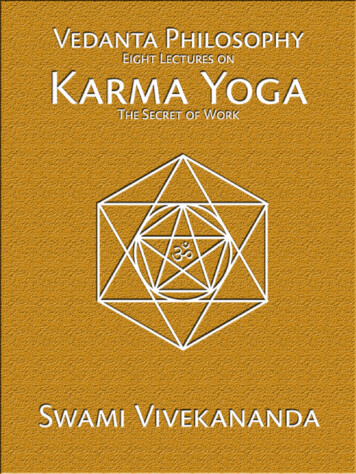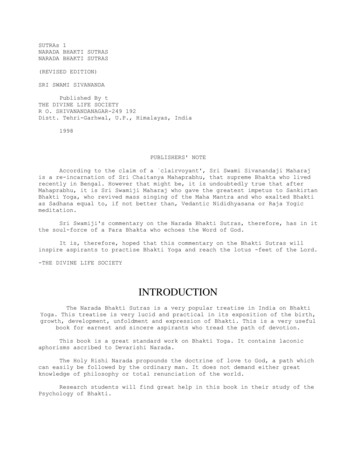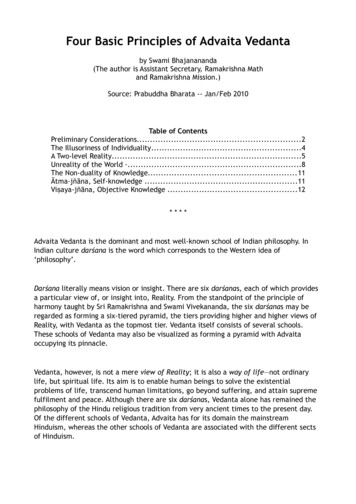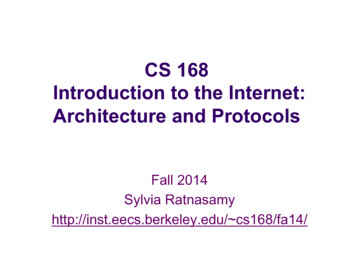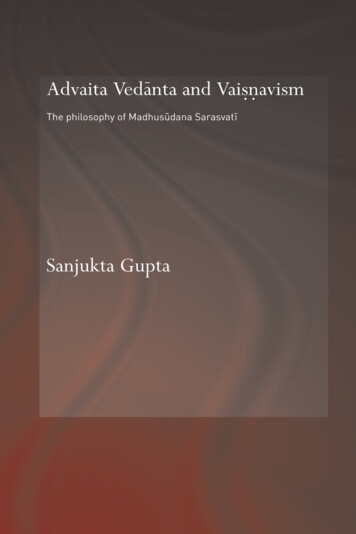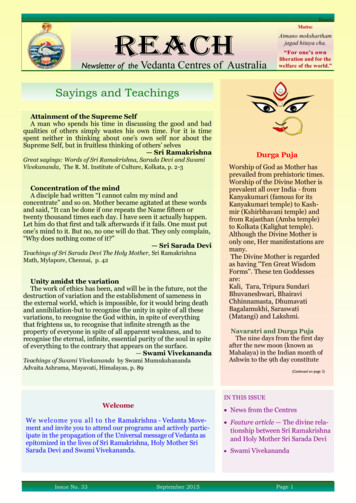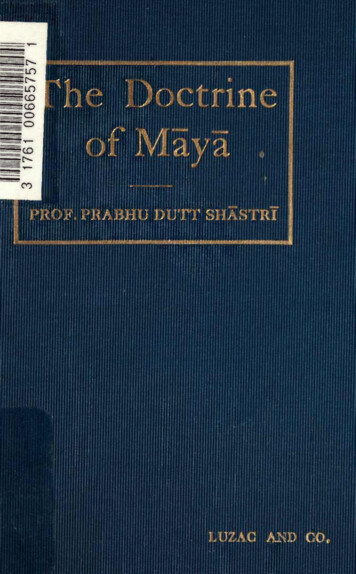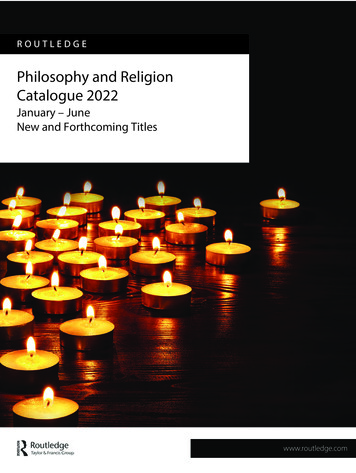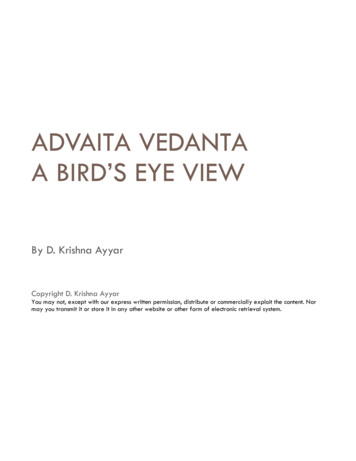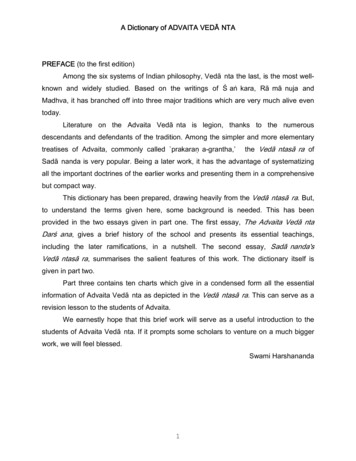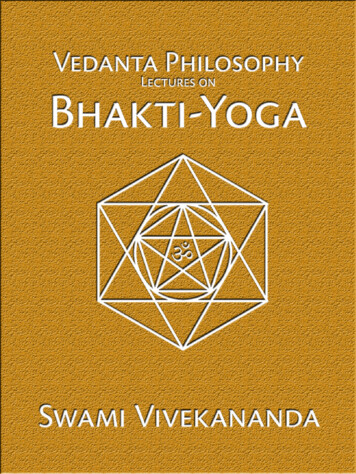
Transcription
Bhakti‑Yogai
Bhakti‑YogaWritingsAddress by Swami Vivekananda on “The Ideal of a Universal Religion”Vedanta Philosophy: Lectures by the Swami Vivekananda on “The Cosmos”Vedanta Philosophy: Lecture by the Swami Vivekananda on “The Atman”Vedanta Philosophy: Lecture by the Swami Vivekananda on “The Real andApparent Man”Vedanta Philosophy: Lecture by the Swami Vivekananda on “Bhakti Yoga”The Vedanta Philosophy: An Address Before the Graduate PhilosophicalSociety of Harvard UniversityVedanta Philosophy: Eight Lectures by the Swami Vivekananda on KarmaYoga (The Secret of Work)Vedanta Philosophy: Lectures by the Swami Vivekananda on Raja Yoga andOther SubjectsMy MasterVedanta Philosophy: Lectures by the Swami Vivekananda on Jnana Yogaii
Vedânta PhilosophyLectures onBhakti‑Yoga1896Swâmi Vivekânanda1863–1902信YOGeBooks: Hollister, MO2013:09:01:20:26:49iii
Vedânta Philosophy Lectures on Bhakti‑YogaCopyrightYOGeBooks by Roger L. Cole, Hollister, MO 65672 2010 YOGeBooks by Roger L. ColeAll rights reserved. Electronic edition published 2010isbn: 978‑1‑61183‑034‑7 (pdf)isbn: 978‑1‑61183‑035‑4 (epub)www.yogebooks.comiv
EpigraphEpigraphThat which exists is One: sages call it variously.Rigveda, I, 164, 46.v
Bhakti‑Yogavi
ContentsBhakti‑YogaI Definition of Bhakti.II The Philosophy of Îśvara.III Spiritual Realisation, the Aim of Bhakti‑Yoga.IV The Need of a Guru.V Qualifications of the Aspirant and the Teacher.VI Incarnate Teachers and Incarnation.VII The Mantra: Om: Word and Wisdom.VIII Worship of Substitutes and Images.IX The Chosen Ideal.X The Method and the Means.Parâ‑Bhakti‑YogaI The Preparatory Renunciation.II The Bhakta’s Renunciation Results from Love.III The Naturalness of Bhakti‑Yoga and Its Central Secret.IV The Forms of Love‑manifestation.V Universal Love and How It Leads to Self‑surrender.VI The Higher Knowledge and the Higher Love are One to the True Lover.vii
Bhakti‑YogaVII The Triangle of Love.VIII The God of Love is His own Proof.IX Human Representations of the Divine Ideal of Love.X Conclusion.viii
Bhakti‑Yoga1
Bhakti‑Yoga2
Bhakti‑Yoga3
Bhakti‑YogaEpigraph“He is the Soul of the Universe; He is immortal; His is the Rulership;He is the All‑Knowing, the All‑Pervading, the Protector of the Universe,the Eternal Ruler. None else is there efficient to govern the Worldeternally. He who at the beginning of creation projected Brahmâ (i. e.,the universal consciousness), and Who delivered the Vedas unto him—seeking liberation I go for refuge unto that Effulgent One Whose lightturns the understanding towards the Âtman.”—Śwetâśvatara‑Upanîshad, VI. 17–18.4
IBDefinition of Bhakti.hakti‑yoga is a genuine, real search after the Lord, a searchbeginning, continuing and ending in Love. One singlemoment of the madness of extreme love to God brings useternal freedom. “Bhakti,” says Nârada in his explanation of theBhakti‑Aphorisms, “is intense love to God.”—“When a man getsit he loves all, hates none; he becomes satisfied for ever.”—“Thislove cannot be reduced to any earthly benefit,” because as longas worldly desires last that kind of love does not come. “Bhaktiis greater than Karma, greater than Yoga, because these areintended for an object in view, while Bhakti is its own fruition,its own means and its own end.”Bhakti has been the one constant theme of our sages.Apart from the special writers on Bhakti, such as Sândilya orNârada, the great commentators on the Vyâsa‑Sûtras, evidentlyadvocates of Knowledge (Jnâna), have also something verysuggestive to say about Love. Even when the commentator isanxious to explain many, if not all, of the texts so as to makethem import a sort of dry knowledge, the sûtras, in the chapteron worship especially, do not lend themselves to be easilymanipulated in that fashion.5
Bhakti‑YogaThere is not really so much difference between Knowledge(Jnâna) and Love (Bhakti) as people sometimes imagine.We shall see as we go on that in the end they converge andmeet at the same point. So also it is with Râja‑yoga, which,when pursued as a means to attain liberation, and not (asunfortunately it frequently becomes in the hands of charlatansand mystery‑mongers) as an instrument to hoodwink theunwary, leads us also to the same goal.The one great advantage of Bhakti is that it is the easiest, andthe most natural way to reach the great divine end in view;its great disadvantage is that in its lower forms it oftentimesdegenerates into hideous fanaticism. The fanatical crew inHinduism, or Mahomedanism, or Christianity, have always beenalmost exclusively recruited from these worshippers on thelower planes of Bhakti. That singleness of attachment (Nishtha)to a loved object, without which no genuine love can grow, isvery often also the cause of the denunciation of everything else.All the weak and undeveloped minds in any religion or countryhave only one way of loving their own ideal, i. e., by hating everyother ideal. Herein is the explanation of why the same manwho is so lovingly attached to his own ideal of God, so devotedto his own ideal of religion, becomes a howling fanatic as soonas he sees or hears any thing of any other ideal. This kind of loveis somewhat like the canine instinct of guarding the master’sproperty from intrusion; only even the dog’s instinct is betterthan the reason of man, for the dog never mistakes its masterfor an enemy in whatever dress he may come before it. Againthe fanatic loses all power of judgment. Personal considerationsare in his case of such absorbing interest that to him it is noquestion at all what a man says—whether it is right or wrong;but the one thing he is always particularly careful to knowis, who says it. The same man who is kind, good, honest, andloving, to people of his own opinion will not hesitate to do thevilest deeds, when they are directed against persons beyondthe pale of his own religious brotherhood.6
Definition of BhaktiBut this danger exists only in that stage of Bhakti which iscalled the preparatory (gauni). When Bhakti has become ripeand has passed into that form which is called the supreme (para)no more is there any fear of these hideous manifestations offanaticism; that soul which is overpowered by this higher formof Bhakti is too near the God of Love to become an instrumentfor the diffusion of hatred.It is not given to all of us to be harmonious in the building upof our characters in this life: yet we know that that character is ofthe noblest type in which all these three—knowledge and loveand yoga—are harmoniously fused. Three things are necessaryfor a bird to fly—the two wings and the tail as a rudder forsteering. Jnâna (knowledge) is the one wing, Bhakti (love) is theother, and Yoga is the tail that keeps up the balance. For thosewho cannot pursue all these three forms of worship togetherin harmony, and take up, therefore, Bhakti alone as their way, itis necessary always to remember that forms and ceremonials,though absolutely necessary for the progressive soul, have noother value than taking us on to that state in which we feel themost intense love to God.There is a little difference in opinion between the teachers ofKnowledge and those of Love, though both admit the power ofBhakti. The Jnânins hold Bhakti to be an instrument of liberation,the Bhaktas look upon it both as the instrument and the thingto be attained. To my mind this is a distinction without muchdifference. In fact, Bhakti, when used as an instrument, reallymeans a lower form of worship, and the higher form becomesinseparable from the lower form of realisation at a later stage.Each seems to lay a great stress upon his own peculiar methodof worship, forgetting that with perfect love true knowledgeis bound to come even unsought, and that from perfectknowledge true love is inseparable.Bearing this in mind let us try to understand what the greatVedântic commentators have to say on the subject. In explainingthe Sûtra Âvrittirasakridupadeśât Bhagavân Śankara says:—7
Bhakti‑Yoga“Thus people say,—‘He is devoted to the king,—He is devotedto the Guru; they say this of him who follows his Guru, and doesso, having that following as the one end in view.’ Similarly theysay—‘The loving wife meditates on her loving husband;’ herealso a kind of eager and continuous remembrance is meant.”This is devotion according to Śankara.“Meditation again is a constant remembrance (of the thingmeditated upon) flowing like an unbroken stream of oil pouredout from one vessel to another. When this kind of rememberinghas been attained (in relation to God) all bondages break. Thusit is spoken of in the scriptures regarding constant rememberingas a means to liberation. This remembering again is of the sameform as seeing, because it is of the same meaning, as in thepassage, ‘When He who is far and near is seen the bonds ofthe heart are broken, all doubts vanish, and all effects of workdisappear.’ (He who is near can be seen, but he who is far canonly be remembered. Nevertheless the scripture says that wehave to see Him who is near as well as Him who is far, therebyindicating to us that the above kind of remembering is as goodas seeing.) “This remembrance when exalted assumes the sameform as seeing Worship is constant remembering as may beseen from the essential texts of scriptures. Knowing, which isthe same as repeated worship, has been described as constantremembering. Thus the memory, which has attained tothe height of what is as good as direct perception, is spoken ofin the Śruti as a means of liberation. ‘This Âtman is not to bereached through various sciences, nor by intellect, nor by muchstudy of the Vedas. Whomsoever this Âtman desires by him isthe Âtman attained, unto him this Âtman discovers himself.’Here after saying that mere hearing, thinking, and meditatingare not the means of attaining this Âtman, it is said, ‘Whom thisÂtman desires by him the Âtman is attained.’ The extremelybeloved is desired; by whomsoever this Âtman is extremelybeloved, he becomes the most beloved of the Âtman. So thatthis beloved may attain the Âtman, the Lord himself helps. For8
Definition of Bhaktiit has been said by the Lord: ‘Those who are constantly attachedto me and worship me with love—I give that direction to theirwill by which they come to me.’ Therefore it is said that, towhomsoever this remembering, which is of the same form asdirect perception, is very dear, because it is dear to the Objectof such memory‑perception, he is desired by the SupremeÂtman, by him the Supreme Âtman is attained. This constantremembrance is denoted by the word Bhakti.”So says Bhagavân Râmânuja in his commentary on the SûtraAthâto Brahma Jijnâsâ.In commenting on the Sûtra of Patanjali ÎśvaraPranidhânâdvâ—i. e., ‘By the worship of the Supreme Lord,’—Bhoja says, “Pranidhânâ is that sort of Bhakti in which, withoutseeking results, such as sense‑enjoyments, etc., all works arededicated to that Teacher of teachers.” Also Bhagavân Vyâsa,when commenting on the same, defines Pranidhâna as “theform of Bhakti by which the mercy of the Supreme Lordcomes to the yogin and blesses him by granting him his desires.”According to Śândilya, “Bhakti is intense Love to God.” Thebest definition is, however, that given by the king of Bhaktas,Prahlâda: “That deathless love which the ignorant have forthe fleeting objects of the senses—as I keep meditating onThee—may not that (sort of intense) love (for Thee) slip awayfrom my heart.” Love! For whom? For the Supreme Lord Îśvara.Love for any other being, however great, can not be Bhakti;for, as Râmânuja says in his Śrî Bhâshya quoting an ancientÂchârya, i. e., a great teacher. “From Brahmâ to a clump of grassall things that live in the world are slaves of birth and deathcaused by Karma; therefore they cannot be helpful as objectsof meditation, because they are all in ignorance and subjectto change.” In commenting on the word anurakti used byŚândilya, the commentator Svapneśvara says that it means anu,after, and rakti, attachment; i. e., the attachment which comesafter the knowledge of the nature and glory of God; else a blindattachment to any one, e. g., to wife or children would be Bhakti.9
Bhakti‑YogaWe plainly see, therefore, that Bhakti is a series or succession ofmental efforts at religious realisation beginning with ordinaryworship and ending in supremely intense love for the Îśvara.10
IIThe Philosophy of Îśvara.Who is Îśvara?—“From Whom is the birth, continuationand dissolution of the universe,”—He is Îśvara—“theEternal, the Pure, the Ever Free, the Almighty, theAll‑Knowing, the All‑Merciful, the Teacher of all teachers;” andabove all—“He, the Lord is, of His own nature, inexpressibleLove.”These certainly are the definitions of a personal God. Are therethen two Gods? The “Not this, Not this,” the Satchit‑ânanda, theExistence‑Knowledge‑Bliss, of the philosopher, and this God ofLove of the Bhakta? No, it is the same Satchit‑ânanda who isalso the God of Love, the impersonal and personal in one. It hasalways to be understood that the personal God worshipped bythe Bhakta is not separate or different from the Brahman. Allis Brahman, the One without a second: only the Brahman, asunity or absolute, is too much of an abstraction to be lovedand worshipped; so the Bhakta chooses the relative aspect ofBrahman, that is, Îśvara, the Supreme Ruler. To use a simile:Brahman is as the clay or substance out of which an infinitevariety of articles are fashioned. As clay, they are all one; butform or manifestation differentiates them. Before ever one ofthem was made, they all existed potentially in the clay; and, of11
Bhakti‑Yogacourse, they are identical substantially; but when formed, andso long as the form remains, they are separate and different;the clay‑mouse can never become a clay‑elephant, because,as manifestations, form alone makes them what they are,though as unformed clay they are all one. Îśvara is the highestmanifestation of the absolute reality, or, in other words, thehighest possible reading of the Absolute by the human mind.Creation is eternal, and so also is Îśvara.In the fourth pâda of the fourth chapter of his Sûtras, afterstating the almost infinite power and knowledge which willcome to the liberated soul after the attainment of Moksha,Vyâsa makes the remark, in an aphorism, that none, however,will get the power of creating, ruling, and dissolving theuniverse, because that belongs to God alone. In explaining theSûtra it is easy for the dualistic commentators to show howit is ever impossible for a subordinate soul, Jîva, to have theinfinite power and total independence of God. The thoroughdualistic commentator Madhvâchârya deals with this passagein his usual summary method by quoting a verse from theVarâha‑Purâna.In explaining this aphorism the commentator, Râmânuja,says:—This doubt being raised, whether among the powersof the liberated souls is included that unique power of theSupreme One, that is, of creation, etc., of the universe and eventhe Lordship of all, or whether, without that, the glory of theliberated consists only in the direct perception of the SupremeOne, we get as an argument the following: It is reasonablethat the liberated get the Lordship of the universe, becausethe scriptures say, ‘He attains extreme sameness with the PureOne,’ because, as the scriptures say, he attains to extremesameness with the Supreme One and all his desires are realized.Now extreme sameness and realization of all desires cannotbe attained without the unique power of the Supreme Lord,namely that of governing the universe. Therefore, to attain therealization of all desires and the extreme sameness with the12
The Philosophy of ÎśvaraSupreme, we must all admit that the liberated get the powerof ruling the whole universe. To this we reply that the liberatedget all the powers except that of ruling the universe. Ruling theuniverse is guiding the form and the life and the desires of all thesentient and the non‑sentient beings, excepting the liberatedones from whom all that veils His true nature has been removed,and who enjoy the glory of the unobstructed perception of theBrahman. This is proved from the scriptural text, ‘From whomall these things are born, by whom all that are born live, untowhom they, departing, return; ask about It, That is Brahman.’ Ifthis quality of ruling the universe be a quality common even tothe liberated, then this text would not apply as a definition ofBrahman, defining Him through His rulership of the universe.The uncommon alone has to be specially defined; therefore,—‘My beloved boy, alone, in the beginning, there existed the Onewithout a second. That saw and felt I will give birth to the many.That projected heat.’—‘Brahman, indeed, alone existed in thebeginning. That One evolved. That projected a blessed form,the Kshatra. All these gods are Kshatras: Varuna, Soma, Rudra,Parjanya, Yama, Mrityu, Îśâna.’—‘Âtman, indeed, existed alonein the beginning; nothing else vibrated; He, seeing, projectedthe world; He projected the world after.’—‘Alone Nârâyanaexisted; neither Brahmâ nor Îśâna, nor the Dyâvâ‑Prithvî, northe stars, nor water, nor fire, nor Soma nor the Sun. He did nottake pleasure alone. He after His meditation had one daughter,the ten organs, etc.,’—in texts like these and others as,—‘Wholiving in the earth is separate from the earth, who living in theÂtman, etc.,’ the Śrutis speak of the Supreme One as the subjectof the work of ruling the universe Nor in these descriptionsof the ruling of the universe is there any position of theliberated soul by which such a soul may have the ruling of theuniverse ascribed to it. In explaining the next Sûtrâ, Râmânujasays, “If you say it is not so, because there are direct texts in theVedas in evidence to the contrary, these texts refer to the gloryof the liberated in the spheres of the subordinate deities.” This13
Bhakti‑Yogaalso is an easy solution of the difficulty. Although the systemof Râmânuja admits the unity of the total, within that totalityof existence there are, according to him, eternal differences.Therefore, for all practical purposes, this system also beingdualistic, it was easy for Râmânuja to keep up the distinctionbetween the personal soul and the personal God very clearly.We will now try to understand what the great representativeof the Adwaita School has got to say on the point. We shall seehow the Adwaita system maintains all the hopes and aspirationsof the dualist intact, and at the same time propounds its ownsolution of the problem, in consonance with the high destinyof divine humanity. Those, who aspire to retain their individualmind even after liberation, and to remain distinct will haveample opportunity of realising their aspiration and enjoy theblessing of the qualified Brahman. These are they who have beenspoken of in the Bhâgavata Purâna thus:—“O king, such are theglorious qualities of the Lord that the sages whose only pleasureis in the Self, and from whom all bondages have fallen off, eventhey love the Omni‑Present with the love that is for love’s sake.”These are they who are spoken of by the Sânkhyas as gettingmerged in nature in this cycle so that, after attaining perfection,they may come out in the next as lords of world‑systems. Butnone of these ever becomes equal to God (Îśvara). Those whoattain to that state where there is neither creation, nor created,nor creator, where there is neither knower, nor knowable, norknowledge, where there is neither I, nor thou, nor he, wherethere is neither subject, nor object, nor relation, “there, who isseen by whom?”—such persons have gone beyond everything,beyond “where words cannot go nor mind,” gone to that whichthe Śrutîs declare as “Not this, Not this;” but for those whocannot, or will not reach this state, there will inevitably remainthe triune vision of the one undifferentiated Brahman as nature,soul, and the interpenetrating sustainer of both—Îśvara. So,when Prahlâda forgot himself, he found neither the universenor its cause; all was to him one Infinite, undifferentiated by14
The Philosophy of Îśvaraname and form; but as soon as he remembered that he wasPrahlâda there was the universe before him and with it theLord of the universe—“the repository of an infinite numberof blessed qualities.” So it was with the blessed Gopîs. So longas they had lost sense of their own personal identity andindividuality, they were all Krishnas, and when they began againto think of him as the One to be worshipped, then they wereGopîs again, and immediately “Unto them appeared Krishnawith smile on his lotus face, clad in yellow robes and havinggarlands on, the embodied conqueror (in beauty) of the god oflove.” (Bhâgavata Purâna).Now to go back to our Âchârya Śankara: “Those,” he says,“who by worshipping the qualified Brahman attain conjunctionwith the Supreme Ruler preserving their own mind—is theirglory limited or unlimited? This doubt arising, we get as anargument:—Their glory should be unlimited, because of thescriptural texts ‘They attain their own kingdom’—‘To him allthe gods offer worship’—‘Their desires are fulfilled in all theworlds.’ As an answer to this, Vyâsâ writes ‘Without the powerof ruling the universe.’ Barring the power of creation, etc., ofthe universe, the other powers such as animâ, etc., are acquiredby the liberated. As to ruling the universe, that belongs to theeternally perfect Îśvara. Why? Because He is the subject of all thescriptural texts as regards creation, etc., and the liberated soulsare not mentioned in any connection with creation, etc. TheSupreme Lord, indeed, is alone engaged in ruling the universe.The texts as to creation, etc., all point to Him. Also there is giventhe adjective “ever perfect.” Also the scriptures say that thepowers animâ, etc., of others are from the search after, and theworship of, God. Therefore they have no place in the ruling ofthe universe. Again on account of their possessing their ownminds it is possible that their wills may differ, and that, whilstone desires creation, another may desire destruction. The onlyway of avoiding this conflict is to make all wills subordinate to15
Bhakti‑Yogasome one will. Therefore the conclusion is that the wills of theliberated are dependent on the will of the Supreme Ruler.”Bhakti, then, can be directed towards Brahman, only in hispersonal aspect.—“The way is more difficult for those, whosemind is attached to the Absolute!” Bhakti has to float onsmoothly with the current of our nature. True it is that we cannothave any idea of the Brahman which is not anthropomorphic,but is it not equally true of everything we know? The greatestpsychologist the world has ever known, Bhagavân Kapila,demonstrated ages ago that human consciousness is one of theelements in the make‑up of all the objects of our perceptionand conception, internal as well as external. Beginning withour own bodies and going up to Îśvara we may see that everyobject of our perception is this consciousness plus a somethingelse, whatever that may be; and this unavoidable mixtureis what we ordinarily think of as reality. Indeed it is, and everwill be, all of the reality that is possible for the human mindto know. Therefore to say that Îśvara is unreal, because He isanthropomorphic, is sheer nonsense. It sounds very muchlike the occidental squabble on idealism and realism, whichfearful‑looking quarrel has for its foundation a mere play on theword real. The idea of Îśvara covers all the ground ever denotedand connoted by the word real, and Îśvara is as much real asanything else in the universe; and after all the word real meansnothing more than what has now been pointed out. Such is ourphilosophical conception of Îśvara.16
IIISpiritual Realisation, the Aimof Bhakti‑Yoga.To the Bhakta these dry details are necessary only tostrengthen his will; beyond that they are of no use to him.For he is treading on a path which is fitted very soon to leadhim beyond the hazy and turbulent regions of reason, to leadhim to the realm of realisation. He, soon, through the mercy ofthe Lord, reaches a plane where pedantic and powerless reasonis left far behind, and the mere intellectual groping throughthe dark gives place to the daylight of direct perception. He nomore reasons and believes, he almost perceives. He no moreargues, he senses. And is not this seeing God, and feeling God,and enjoying God, higher than everything else? Nay, Bhaktashave not been wanting who have maintained that it is higherthan even Moksha—liberation. And is it not also the highestutility? There are people—and a good many of them, too—in the world who are convinced that only that is of use andutility which brings to man creature‑comforts. Even Religion,God, Eternity, Soul, none of these is of any use to them, asthey do not bring them money or physical comfort. To suchall those things, which do not gratify the senses and appease17
Bhakti‑Yogathe appetites, are of no utility. In every mind, utility, however, isconditioned by its own peculiar wants. To men, therefore, whonever rise higher than eating, drinking, begetting progeny, anddying, the only gain is in sense enjoyments; and they must waitand go through many more births and re‑incarnations to learnto feel even the faintest necessity for anything higher. But thoseto whom the eternal interests of the soul are of much highervalue than the fleeting interests of this mundane life, to whomthe gratification of the senses is but like the thoughtless play ofthe baby, to them God and the love of God form the highestand the only utility of human existence. Thank God there aresome such still living in this world of too much worldliness.Bhakti‑Yoga, as we have said, is divided into the gaunî or thepreparatory, and the parâ or the supreme forms. We shall find,as we go on, how, in the preparatory stage, we unavoidablystand in need of many concrete helps to enable us to get on;and, indeed, the mythological and symbological parts of allreligions are natural growths which early environ the aspiringsoul and help it Godward. It is also a significant fact thatspiritual giants have been produced only in those systems ofreligion where there is an exuberant growth of rich mythologyand ritualism. The dry fanatical forms of religion which attemptto eradicate all that is poetical, all that is beautiful and sublime,all that gives a firm grasp to the infant mind tottering in itsGodward way—the forms which attempt to break down thevery ridge poles of the spiritual roof, and in their ignorantand superstitious conceptions of truth try to drive away allthat is life‑giving, all that furnishes the formative material tothe spiritual plant growing in the human soul—such forms ofreligion too soon find that all of what is left to them is but anempty shell, a contentless frame of words and sophistry, withperhaps a little flavour of a kind of social scavengering or theso‑called spirit of reform. The vast mass of those whose religionis like this are conscious or unconscious materialists—the endand aim of their lives here and hereafter being enjoyment,18
Spiritual Realisation, the Aim of Bhakti‑Yogawhich, indeed, is to them the alpha and the omega of humanlife. Work like street‑cleaning and scavengering intended forthe material comfort of man is, according to them, the “be‑all”and “end‑all” of human existence; and the sooner the followersof this curious mixture of ignorance and fanaticism comeout in their true colors, and join, as they well deserve to do,the ranks of atheists and materialists, the better will it be forthe world. One ounce of the practice of righteousness and ofspiritual self‑realisation out‑weighs tons and tons of frothy talkand nonsensical sentiments. Show us one, but one, giganticspiritual genius growing out of all this dry dust of ignoranceand fanaticism; and if you cannot, close your mouths, open thewindows of your hearts to the clear light of truth, and sit likechildren at the feet of those who know what they are talkingabout—the sages of India. Let us then listen attentively to whatthey say.19
Bhakti‑Yoga20
IVEThe Need of a Guru.very soul is destined to be perfect, and every being, in theend, will attain the state of perfection. Whatever we arenow, is the result of our acts and thoughts in the past; andwhatever we shall be in the future, will be the result of what wethink and do now. But this, our shaping of our own destinies,does not preclude our receiving help from outside; nay, in thevast majority of cases such help is absolutely necessary. Whenit comes, the higher powers and possibilities of the soul arequickened, spiritual life is awakened, growth is animated, andman becomes holy and perfect in the end.This quickening impulse cannot be derived from books.The soul can only receive impulses from another soul, andfrom nothing else. We may study books all our lives, we maybecome very intellectual; but, in the end, we find that we havenot developed at all spiritually. It is not true that a high orderof intellectual development always goes hand in hand witha proportionate development of the spiritual side in man. Instudying books we are sometimes deluded into thinking thatthereby we are being spiritually helped; but, if we analyse theeffect of the study of books on ourselves, we shall find that, atthe utmost, it is only our intellect that derived profit from such21
Bhakti‑Yogastudies, but not our inner spirit. This insufficiency of books toquicken spiritual growth is the reason why, although almostevery one of us can speak most wonderfully on spiritual matters,when it comes to action and the liv
Vedanta Philosophy: Lecture by the Swami Vivekananda on “Bhakti Yoga” The Vedanta Philosophy: An Address Before the Graduate Philosophical Society of Harvard University Vedanta Philosophy: Eight Lectures by the Swami Vivekananda on Karma Yoga (The Secret of Work) Vedanta Philosophy: Lectures by the Swami Vivekan
